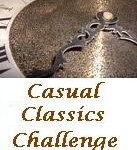I don’t remember ever reading this book. I have vague memories of seeing the movie, but couldn’t really remember the plot. Now that I’ve finished it, it seems familiar but I suspect that is more the comfortable writing style, since none of it seemed familiar while I was reading it.
Quick plot recap. The narrator is Scout Finch who is almost 6 at the time the story starts. She spends most of her time with her brother Jem, who is almost 10 when the story starts. We watch their story over about 4 years. Their father, Atticus Finch, is a lawyer. They live in a small town in Alabama and it is 1930 so they are experiencing the Depression. We meet the neighbors on their street, but we don’t get to meet Arthur (Boo) Radley. Years ago he got into a scrape with the law and his father said if the judge let him come home he would never get in trouble again. He didn’t, because he didn’t come out of the house again. The way Scout tells the story, that wasn’t the best thing his father could have done for him. But, the Radley’s don’t come out or socialize so it might have happened to him even if he hadn’t gotten in trouble.
After spending half the book, and a few years, introducing the characters and giving us a good feel for the town and the people and the way of life, we move into the action. A black man has been accused of raping a white woman and Atticus has been assigned as his defense counsel. This being 1930 and a black man, there are some people who don’t see any need to wait for a trial. Others are fine with going through the motions of a trial but they wonder why Atticus is bothering to actually defend him. During the actual trial is is pretty obvious that the woman and father who brought the charges have lied about what happened, but the jury can’t take the word of a black man over that of a white man.
Even though the black man is convicted and then dies trying to escape prison, the white man who started this realizes he has been made a fool of and swears to get back at Atticus, the judge, and others he feels participated in shaming him. All of this culminates with an attack on Scout and Jem, but they survive, and Scout meets Boo Radley.
I love the book! I laughed so much during the early chapters where Scout is talking about going to school or playing with her brother. I found their fascination with Boo Radley interesting, and could see where playing out the scenes would help them understand it a bit more. The neighbors seem just right, those who gossip and judge, and those who love and are so tender. Atticus is a good father, helping his children to learn the right lessons.
The prejudice is well displayed, so that it seems believable but still stands out as unacceptable. I’m not saying I could never be like that, but in this day and age the overt racism is very obvious and disturbing. The point of view of the 6 year old is great, because Scout has a peculiar blend of innate culture from her surroundings with a child’s honest belief that there aren’t differences. She doesn’t really question the adults, but she doesn’t agree with them or even understand them.
The scene with the Missionary Society was so well done – at first I was thinking how interesting to care so much about others in a foreign land and not the poor or black here, but then the comments are so pointed that it becomes clear that the patronizing superiority is applied to everyone who isn’t “like us” whether they are in another country or right here in town.
That is one aspect that was raised, and I have run into it in other period pieces lately by LM Montgomery – the concept of groups or castes of people. It was interesting watching Jem try to decipher what put someone in one group or another, since it isn’t exactly clear whether it’s longevity as owner of a plot of land, or being literate, or what.
The book is also a Christian book, showing the difference between those who live it and those who just spout it. I found the venom that the legalistic group put out toward the kind and wise woman who loved flowers to be very telling.
My younger nephew is reading this in school and he says the book is boring. I wonder if they are doing something wrong in the school or if this is really just lost on someone his age. I found it laugh-out-loud funny, suspenseful, and convicting. But not boring!
I also realized, while writing this review, that the book is written in the first person. It is so well done that I never flinched at that, it just seemed natural. But it is difficult to do and many others who have tried it shouldn’t have.







